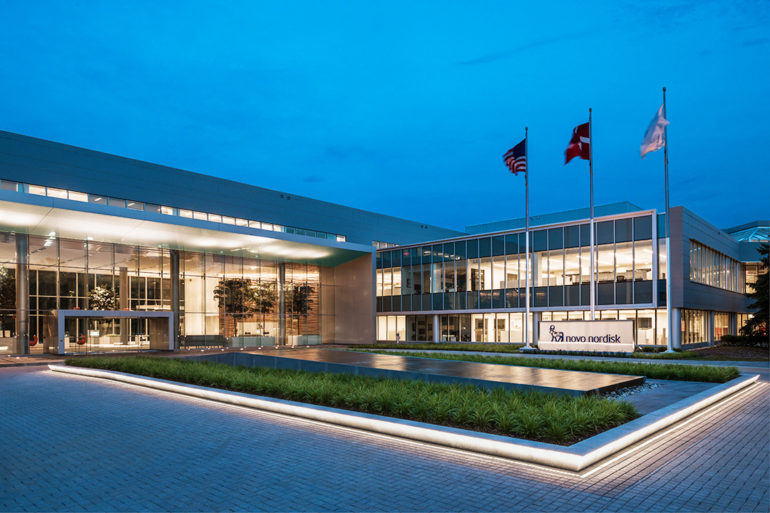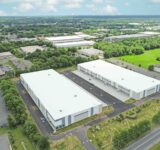800 Scudders Mill Road in Plainsboro — Courtesy: HFF
By Joshua Burd
As an investment opportunity, 800 Scudders Mill Road checked just about every box.
A state-of-the-art, trophy office complex that was only three years old. A prime location just outside Princeton. And, perhaps most important of all, a net lease with a blue-chip, global pharmaceutical giant, Novo Nordisk Inc., with a longstanding presence in the market.
The opportunity was so good that it attracted a buyer from nearly 7,000 miles away — a consortium of South Korean investors led by Hana Asset Management Co. Their purchase price — an eye-catching $305 million — was enough to win the deal for the 762,000-square-foot property in Plainsboro and become the largest single-asset sale in New Jersey in 2016.
Capital markets experts weren’t surprised to see Asian investors land in New Jersey.
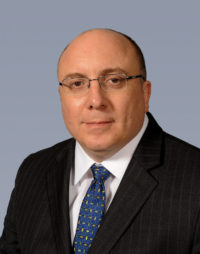
“That foreign capital is out there and making deals,” said Jose Cruz, a senior managing director with HFF, who helped broker the sale last summer on behalf of the building’s development team.
Overseas investors have long had a role in New Jersey’s commercial real estate sector, but experts say their impact is now as high as it’s ever been. For foreign buyers that may be priced out of New York City, the Garden State offers a good value with an abundance of luxury multifamily towers, Class A headquarters buildings and other high-quality or high-profile properties that can meet the same investment criteria.
“I think it’s about yield and diversifying out of certain markets,” Cruz said, adding that foreign capital has even looked beyond New Jersey’s Hudson waterfront, as evidenced by the Plainsboro sale and others. “You have quality deals and you have the ability to buy these types of assets in the suburban markets — and they’re not afraid of them anymore.”
The state can look even better to those who are simply not accustomed to the highly competitive, complex market of New York City, but still want the proximity.

“This goes for a lot of foreign clients,” said Ken Lorman, a senior vice president with Lee & Associates, who advised Hana Asset Management in the Plainsboro deal. “Buying a building in New York is just too fast for them — the process is just too competitive and it’s tough for them to actually directly buy. They can joint venture and do things like that, but as a result, they like to look in New Jersey and other top (markets).”
Overseas capital is coming to New Jersey in all shapes and sizes. According to the research firm Real Capital Analytics, industrial property in 2015 accounted for nearly all of the roughly $2 billion in transactions involving foreign cash, driven by a series of blockbuster portfolio sales that included New Jersey warehouse buildings.
In 2016, activity through three quarters was dominated by office and multifamily sales, which totaled more than $533 million in value, according to Real Capital Analytics. That represented some 98 percent worth of activity involving foreign capital in the state.
The trends speak to another observation by Cruz: A decade ago, “you didn’t see the foreign capital buying multifamily or as much industrial,” he said. And while office buildings with Fortune 500 companies as tenants are still very much in demand, investors from abroad have “expanded their product type and they’ve expanded the quality of what they’re buying.”
When it comes to international buyers, none has made a statement in New Jersey quite like China State Construction Engineering Corp. Affiliates of the Chinese construction giant are planning two separate ground-up projects on the Jersey City waterfront — creating a new current for the flow of foreign capital in the state’s hottest submarket.
One of the affiliates, China Overseas America Inc., is building a 79-story, 800-unit condominium tower at 99 Hudson St. that would rise to 900 feet to become the state’s tallest building. The other, Strategic Capital, broke ground in late October on a 358-unit, two-building condominium complex within the city’s Newport section.
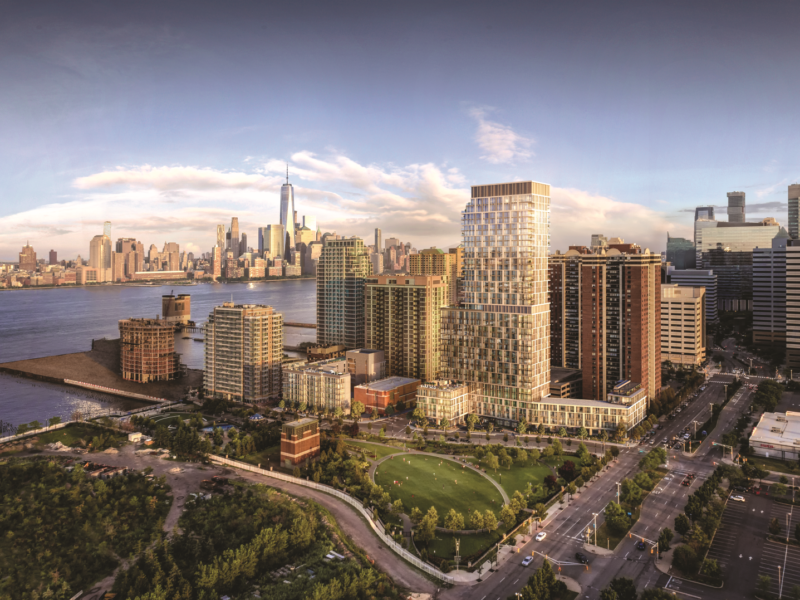
Both projects represent an opportunity for the parent company to build a portfolio in New Jersey — after some 30 years of operating in Manhattan — while staying true to the conglomerate’s business philosophy in its home nation.
“Development is more common in China,” said Phillip Gesue, the chief development officer of Strategic Capital. “There’s not really the trade of income-producing assets like you have in the U.S., where it’s almost like a commodity or an equity that gets traded. … What you see is people buying land, building a building and then selling it out as condominiums or holding it as part of a portfolio forever. “Our parent company is really actively involved in that business, and in some ways it was a natural business model for us to follow here in the United States.”
RELATED: How a Chinese construction giant is planting a flag in New Jersey
Gesue said there was “no question” that foreign capital sources are more active in New Jersey than they were five to 10 years ago. Along with its location and what he sees as the market’s high upside, he pointed to the growth of Asian immigrants here and the overall diverse population.
“All of those things really make for a fertile ground for foreign investors,” Gesue said. “I think that all large investors who have the capacity to come to the states have a tendency to focus on Manhattan, but the value in Jersey is probably much better and it’s a market that a lot of foreign nationals feel very comfortable in. So I think that both of those things bode well for Jersey.”
Experts say the origin of foreign capital can change from year to year, depending on both geopolitical conditions and whether overseas investment funds have simply reached their goals. Through Q3, Far Eastern countries invested nearly $492 million in New Jersey in 2016, accounting for 91 percent of the investments tracked by Real Capital Analytics.
In prior years, it’s been the likes of Canada and the Middle East that have supplied the bulk of the foreign capital to New Jersey.
“It’s a constant ebb and flow,” said Lorman, the Lee & Associates broker. “There are certain countries that become very active, and all of a sudden they fill the mandate and go a little bit quiet and someone else steps in.”
Citing just one example, Cruz said “there could be a slight change — and you don’t even see it coming — in the accounting laws or the tax laws in Australia. And all of a sudden a rash of that capital comes in.” Today, he said, there is a broad mix of foreign investors who are seeking opportunities in New Jersey, from Chinese to German to Israeli.
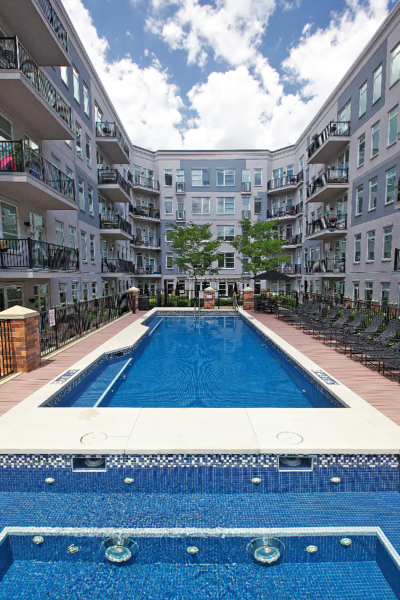
Some of those capital sources are taking a more behind-the-scenes approach than others. For instance, Singapore’s sovereign wealth fund, GIC, is the lead investor in a fund managed by Waltham, Massachusetts-based DSF Group. The firm in 2014 paid $110 million to acquire a 217-unit apartment complex in Hoboken then known as 800 Madison, before selling it early last year for $130 million.
It’s one of several recent deals in the state that involve foreign cash as part of larger investment fund or a joint venture with a domestic partner, but without a foreign entity at the forefront.
Others are involved in deals farther away from the Hudson waterfront.
During a panel discussion last fall, an executive with New York-based AION Partners mentioned a lesser-known detail about his firm’s $183.3 million acquisition last year of Oakwood Village, a 1,224-unit apartment complex in Flanders: It did so under a joint venture with a Chinese bank.
“They had a sole focus on capital preservation, almost a covered bond play,” Victor Cole, principal with AION Partners, said during the New Jersey Apartment Summit in Livingston. “They were looking for a mid to high single-digit yield, with maybe a kicker if we’re able to execute a value-add business plan.
“I especially see Chinese investors, but foreign investors of all stripes, looking to us for investment opportunities, which is interesting.”
Cruz, who also spoke on the panel, questioned whether the market “would have seen that five years ago” — namely, a deal in which a foreign investor saw the value in a suburban, garden-style apartment complex 50 miles from Manhattan.
Experts also point to what’s not necessarily captured by market research — international buyers who were the runner-up for a major transaction. Lorman noted that Hana Asset Management had bid on two or three other properties in the area before breaking through with the Novo Nordisk building in Plainsboro, which was sold by a partnership Ivy Equities, LCOR Inc. and Intercontinental Real Estate Corp.
That has also been the case for other foreign buyers in other recent deals in the Northeast and at least one in New Jersey, the recent $175 million trade of Public Service Enterprise Group’s headquarters in Newark.
When that happens, Cruz said the second- and third-place buyers “are just as important as the winner because “it sets the tone for the next deal” by adding them to the group of prospective investors.
“And they may even be more aggressive on the next one, because they lost this one,” Cruz said. “That cuts across all buyers, but on the international front, you’re more focused because you want to expand that buyer pool.”

